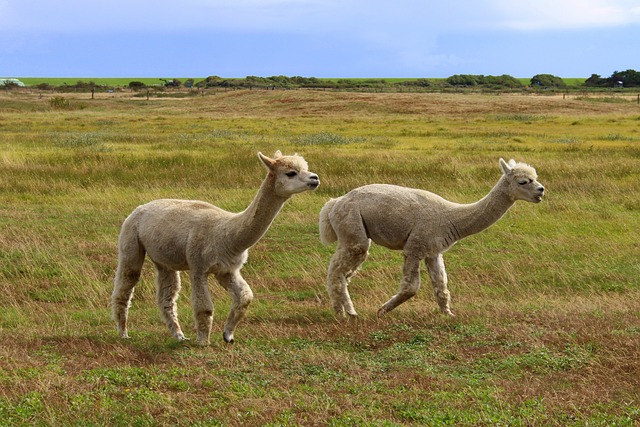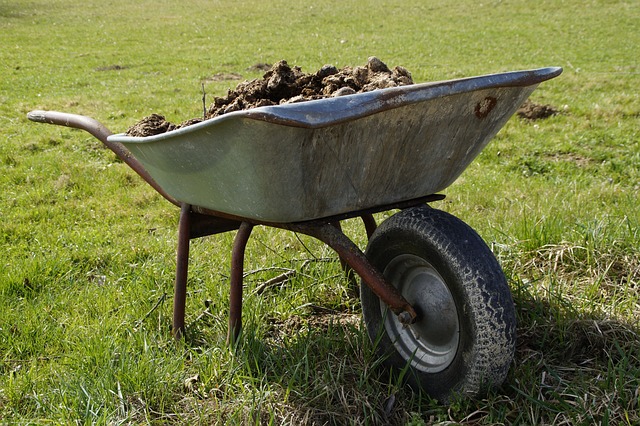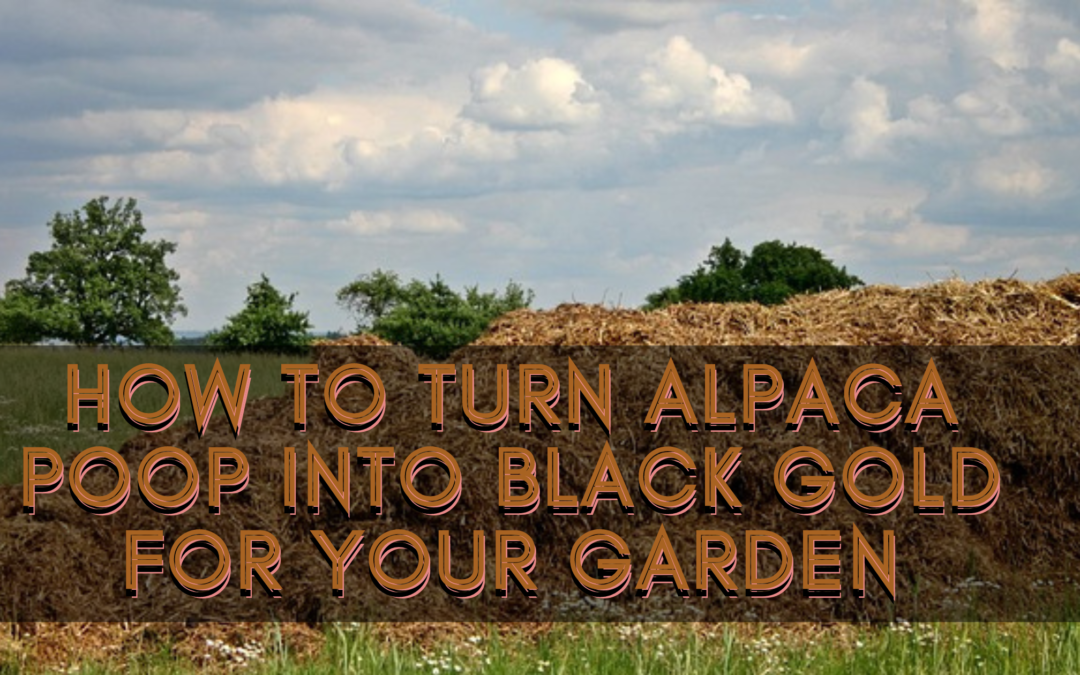Introduction
If you’re an avid gardener, you probably know the value of good compost. Composting is an eco-friendly and sustainable way to enrich the soil in your garden and promote healthy plant growth. But have you ever considered using alpaca poop as a composting material?
Alpaca poop, or manure, is a nutrient-rich material that is low in odor and easy to handle. It’s also a great alternative to chemical fertilizers, which can harm the environment and your plants. Composting with alpaca poop can help you turn your garden into a thriving, green oasis.
In this article, we’ll explore the benefits of composting with alpaca poop and how to turn it into “black gold” for your garden. We’ll cover everything from collecting and preparing alpaca manure to tips for maintaining a healthy compost pile. By the end of this article, you’ll be a pro at turning alpaca poop into nutrient-rich compost that will help your garden thrive.
What are alpacas anyway?

Alpacas are domesticated, camel-like animals that are native to the Andean region of South America. They are part of the Camelid family, which also includes llamas, guanacos, and vicuñas. Alpacas are typically raised for their soft, fine fiber, which is used to make clothing and textiles.
Alpacas are known for their calm and gentle temperament, and they are often raised on farms and ranches for their fiber, as well as for their meat and as pack animals. They are social animals and typically live in herds of up to 20 animals, with a dominant male known as a “macho” leading the group.
Why alpaca poop is a great composting material
The unique properties of alpaca poop make it a great addition to a compost pile. For example, it’s high in nitrogen, low in odor, and contains beneficial microorganisms.
How does alpaca poop compare to other types of manure, such as a cow or chicken poop?
Alpaca poop is a great composting material due to its unique properties that make it an excellent addition to a compost pile. Here are some reasons why alpaca poop is a great composting material:
High in Nitrogen: Alpaca poop is high in nitrogen, which is an essential nutrient for plant growth. Nitrogen is a key component of chlorophyll, the pigment that gives plants their green color and is involved in photosynthesis. Composting with alpaca poop can help provide your plants with the nitrogen they need to grow healthy and strong.
Low in Odor: Compared to other types of manure, such as a cow or chicken poop, alpaca poop is relatively low in odor. This makes it a more pleasant material to work with and reduces the risk of odors emanating from your compost pile.
Contains Beneficial Microorganisms: Alpaca poop contains beneficial microorganisms, such as bacteria and fungi, that help break down organic matter in the compost pile. These microorganisms help convert the alpaca poop and other materials in the compost pile into nutrient-rich compost that can help improve the health of your plants.
Low in Weed Seeds: Alpaca poop is relatively low in weed seeds, which can be a problem with other types of manure. This means that you’re less likely to introduce new weeds into your garden when you use alpaca poop compost.
Compared to Other Manures: In comparison to other types of manure, alpaca poop is lower in odor and easier to handle. It also contains fewer pathogens, making it safer to use in your garden. Additionally, alpaca poop has a lower carbon-to-nitrogen ratio than other manures, which means it breaks down more quickly and produces compost faster.
Overall, alpaca poop is a unique and valuable composting material that can help improve the health of your plants and reduce the need for chemical fertilizers. By incorporating alpaca poop into your compost pile, you can create a nutrient-rich compost that will help your garden thrive.

Where can you find Alpaca Poop?
Alpaca manure can be found on farms and ranches that raise alpacas. If you’re interested in using alpaca manure as a natural fertilizer for your garden, you may be able to purchase it directly from a local alpaca farm or through online retailers that specialize in organic gardening products.
You can also contact local gardening or agricultural organizations, as they may have information on where to find alpaca manure in your area. Keep in mind that alpaca manure may be less widely available than other types of manure, such as a cow or chicken manure, so it may require some research and effort to find a reliable source.
If you live near an alpaca farm, you may also be able to arrange to collect the manure yourself, although be sure to follow any safety precautions and guidelines for handling animal waste. Overall, with a little bit of effort and research, it’s possible to find and use alpaca manure as a natural and sustainable fertilizer for your garden.
How to collect and prepare alpaca poop for composting
If you are interested in composting with alpaca poop, it is important to know how to collect and prepare the poop to create high-quality compost for your garden. Here are the steps for collecting and preparing alpaca poop for composting:
Collecting Alpaca Poop: Collect alpaca poop using a shovel or pitchfork, being careful not to collect any contaminated materials. If possible, try to collect alpaca poop frequently to avoid accumulation and ensure that it remains fresh.
Storing Alpaca Poop: Store the alpaca poop in a covered container or pile to prevent it from drying out or getting wet. If you don’t have a covered container, cover the pile with a tarp or other waterproof material to protect it from the elements.
Mixing with Other Organic Materials: Alpaca poop should be mixed with other organic materials like leaves, straw, or wood chips to create a well-balanced compost pile. The ideal carbon-to-nitrogen ratio for compost is between 25:1 to 30:1. Alpaca poop has a high nitrogen content, so it is important to add carbon-rich materials to balance it out. A good ratio for alpaca poop is about 1:2, meaning for every one part of alpaca poop, add two parts of carbon-rich materials.
Layering the Compost Pile: Layer the alpaca poop and other organic materials to create a well-aerated compost pile. Begin with a layer of carbon-rich materials, such as leaves or straw, followed by a layer of alpaca poop, then another layer of carbon-rich materials. Repeat this process until the pile reaches a height of about 3-4 feet.
Turning the Compost Pile: Turn the compost pile every few weeks to ensure that it is well-aerated and the materials are evenly distributed. This will also help to speed up the decomposition process.
Adding Water: Water the compost pile regularly to maintain moisture levels. A well-maintained compost pile should be damp, but not wet.
Overall, collecting and preparing alpaca poop for composting is a straightforward process. By following these steps, you can create a nutrient-rich compost that will help your garden thrive. Remember, the key is to balance the nitrogen-rich alpaca poop with carbon-rich materials to create a well-aerated compost pile that is regularly turned and watered.
Tips for composting with alpaca poop
Composting with alpaca poop can be a great way to create nutrient-rich compost for your garden. Here are some tips for maintaining a healthy compost pile and avoiding common issues that may arise when composting with alpaca poop:
Add Water: Alpaca poop compost should be kept moist, but not too wet. If the compost pile is too dry, it will not break down properly. Regularly add water to the compost pile to maintain moisture levels.
Turn the Pile: Turning the compost pile helps to aerate it, which promotes decomposition and prevents it from becoming compacted. Regularly turn the compost pile every few weeks.
Balance the Ingredients: As mentioned before, alpaca poop is high in nitrogen, so it is important to balance it with carbon-rich materials like leaves or straw. A good rule of thumb is to use twice as much carbon-rich material as alpaca poop.
Monitor the Temperature: Composting with alpaca poop can create a lot of heat in the compost pile. A temperature of around 130-140°F is ideal for composting, but if the temperature rises too high, it can kill off beneficial microorganisms. Use a compost thermometer to monitor the temperature, and turn the pile more frequently if necessary.
Address Bad Smells: If your alpaca poop compost pile starts to smell bad, it may be too wet or not properly aerated. Turning the pile more frequently or adding more dry, carbon-rich materials can help alleviate the odor.
Use Gloves and Masks: Alpaca poop can contain bacteria and other pathogens, so it’s important to wear gloves and a mask when handling it. This will help prevent the spread of disease.
By following these tips, you can maintain a healthy compost pile with alpaca poop that will help your garden thrive. Remember to monitor the compost pile regularly and adjust as necessary to create nutrient-rich compost for your plants.
Conclusion
In conclusion, composting with alpaca poop can be a highly beneficial and sustainable way to create nutrient-rich compost for your garden. Alpaca poop is high in nitrogen, low in odor, and contains beneficial microorganisms that help break down organic matter in the compost pile. By collecting and preparing alpaca poop properly, you can create high-quality compost that will help your plants thrive.
Maintaining a healthy compost pile with alpaca poop requires a few simple steps, such as balancing the ingredients, turning the pile regularly, and monitoring the temperature. With a little bit of effort and attention, you can create a nutrient-rich compost pile that will promote healthy plant growth and reduces the need for chemical fertilizers.
Composting with alpaca poop is also an environmentally-friendly way to reduce waste and greenhouse gas emissions. By using alpaca poop compost, you can create a more sustainable and eco-friendly garden that benefits both you and the planet.
So if you’re a gardener looking to take your composting to the next level, consider incorporating alpaca poop into your compost pile. With the right techniques and a little bit of patience, you can turn alpaca poop into black gold for your garden.
P.S.: – Would you like to learn more about organic farming or alpacas? Join our EAT FREE Community for Live learning opportunities!



